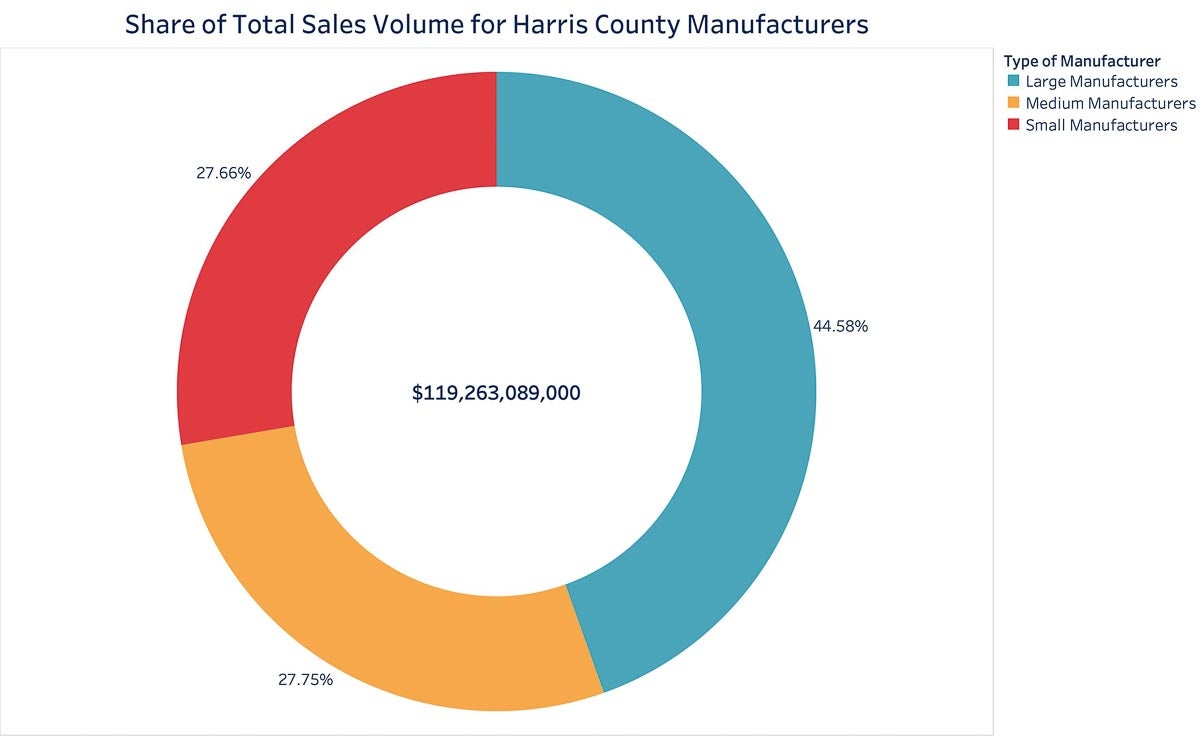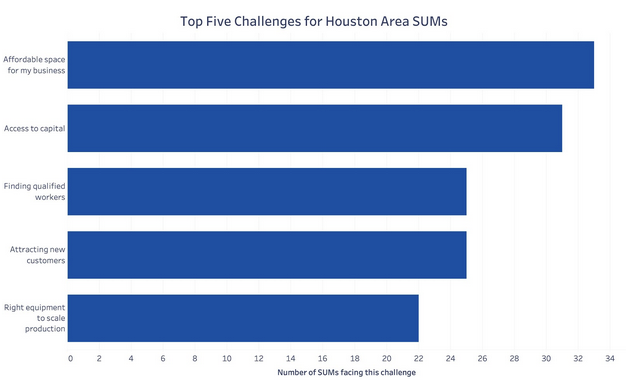City and regional economic development strategies play a role in creating such business-friendly environments. However, the effectiveness of such strategies hinges on understanding the small-business sector’s unique needs, challenges and contributions, which are often undervalued over those of the headline-grabbing, job-generating, large, multinational firms.
Today, unbeknownst to many, the Greater Houston Region is home to a diverse and growing sector of small urban manufacturers, artists, makers and brewers. These firms, which have fewer than 25 employees, operate out of refurbished industrial spaces in the neighborhoods surrounding downtown like East End.
Houston needs to better understand the specific factors limiting small businesses such as these, particularly their capacity to scale production, expand operations and remain in the region. While similar sectors in cities across the country receive outsized attention from policymakers, consumers and industry leaders in their respective cities, Houston’s small manufacturing sector operates largely under the radar.
Findings from our report
Earlier this year, our team conducted a sector-specific survey to help facilitate a clear strategy for future growth and development for small-manufacturer businesses. Partnering with TX/RX Labs, the Houston office of Local Initiatives Support Corporation (LISC) and Beehive Fund/TMAC Gulf Coast, our team collected data from small urban manufacturers, artists and markers operating in the Greater Houston Region.
Our study, The Maker Economy: The Growing Demand of Small Urban Manufacturers in Houston, estimates small manufacturers contributed 28% (roughly $33 billion) to total manufacturing sales in Harris County in 2018. Although these are estimates, it is indicative of the role that small manufacturers can play if new policies, programs or financial support is provided to help scale production and expand within the Houston region.

The data is from businesses under the NAICS codes starting with 31, 32, 33 and 238, which are generally businesses observed as manufacturers. Small manufacturers are defined as businesses with 25 or less employees, medium manufacturers are businesses with 26-150 employees, and large manufacturers include all businesses with over 150 employees. Data Source: Businesses Categorized as Manufacturing - 2018, Urban Data Platform. Source: Chris Servidio, Kinder Institute.
To guide future policy decisions and program development, our report highlights the following as the five most pressing challenges impacting small manufacturing operations in Houston:

The data comes from the responses of the Kinder Institute’s Small Manufacturing Survey (2019), and shows the most pressing challenges facing small urban manufacturers. Source: Chris Servidio, Kinder Institute.
Although those surveyed indicated that the relative affordability of industrial space in Houston has been crucial for early-stage manufacturers, the rising cost of space remains an obstacle for many manufacturers looking to expand. Larger space is critical for businesses to increase production, hire additional employees and purchase machinery requiring a larger footprint.
With increased attention and investment from developers across the city, demand and prices for industrial real estate, especially in the East End neighborhood, has risen sharply. This has squeezed out some manufacturers and many are finding it increasingly difficult to remain in their Inner Loop neighborhoods.
Likewise, our report finds that access to capital is a growing barrier in Houston, especially for those hoping to scale production through the procurement of new materials, tools, equipment, workers or real estate. Seeing a few options, some have turned to commercial bank loans, personal financing or financial support from friends/family to grow their business.
In contrast to manufacturing in the 20th century, today’s jobs require a higher technical skill set that can only be acquired through training, apprenticeships or job-placement programs. More so, younger generations tend not to view manufacturing as an attractive career option. As a result, many manufacturers find it increasingly difficult to find skilled workers prepared for small manufacturing jobs in Houston.
Lastly, manufacturers found that both the lack of awareness among consumers and policymakers and the need for equipment to scale production as the final two challenges impacting growth opportunities in Houston, with additional findings contained within the full report.
Where to go from here
Houston’s manufacturing sector finds itself at a pivotal moment. From the perspective of existing small manufacturers, the barriers identified by our study appear insurmountable. However, Houston is an affordable, innovative and business-friendly city with dedicated local actors and service providers supporting the burgeoning sector.
Local and state policymakers have the momentum to strengthen this network through targeted programming, robust funding opportunities and strategic long-term planning to protect and maintain industrial space in the city. Peer cities, including Baltimore and San Francisco, offer strategies and programs that could be pursued here in Houston.
Specifically, our study sees opportunity in an industrial corridor strategy tying financial incentives, regulations, grant opportunities and workforce development programming to small businesses operating in a defined corridor, similar to the North Mass Corridor in Indianapolis. An industrial corridor would help boost innovation through conglomeration and networking while raising awareness of the sector in the Houston region through place-based branding and marketing.
TX/RX Labs and UP CDC’s upcoming East End MakerHub represents a catalytic opportunity to kickstart an industrial corridor centered in Houston’s East End — a neighborhood uniquely tied to the city’s manufacturing legacy and ripe for future manufacturing development.

